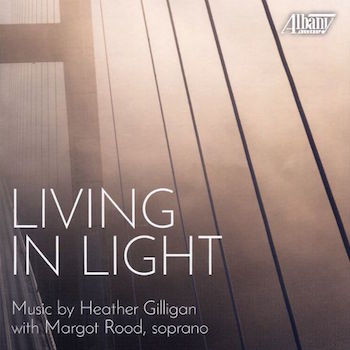Classical CD Review: Brahms Piano Trios and “Living in Light”
Nothing sleepy about the playing or the interpretations in the Yo-Yo Ma and Emanuel Ax disc; New Hampshire’s Heather Gilligan is a composer to watch.

By Jonathan Blumhofer
Yo-Yo Ma and Emanuel Ax have been recording chamber music together now for several decades. Their new recording of the three Brahms piano trios pairs them with violinist Leonidas Kavakos and he more than holds his own. You basically know what you’re getting here – impeccable playing of great repertoire – and, while that much may be predictable, there’s nothing sleepy about the playing or the interpretations.
The Trio no. 1, for instance, heard in its 1890 revision, sounds as brilliant as ever. Kavakos and Ma perfectly match their respective rhythms and articulations throughout; Ax anchors the reading with plenty of sonic weight – but also a lightness touch that renders the densest textures clear and warm. In this ensemble’s hands, the third movement and the coda to the first come across with special poignancy.
The group makes heroic work of the Trio no. 2, its symphonic outer movements seemingly tailor-made for them. The middle ones are plenty engaging, too, with a luminous reading of the rhythmically-off-balance second and a brilliant play of light and shadow marking the whirling scherzo.
Best of all is the C-minor Trio no. 3, which gets an electrifying performance. The outer movements are rhythmically taut and phrased with the focus that always hones in on the overarching, dramatic line. The shadowy second movement is fleet as can be while the rustic third is sweetly and tenderly done.
So, while there might be few surprises in the quality of the performances, there’s a brilliance to the playing in these trios that is captivating. It’s a terrific cycle – one that will be touring (including in Boston) through 2018.

Heather Gilligan’s Living in Light, a collection of six relatively short song cycles by the New Hampshire-based composer, is a new album that capably demonstrates that the art song is not only alive and well but thriving in the early decades of the 21st century.
The title song cycle, a setting of four Sara Teasdale poems for voice and cello, gives a good sense of Gilligan’s style as far as it’s represented on this album: emotionally direct; filled with sweeping, lyrical gestures; and unafraid to venture into the occasionally unexpected sound world.
The piece itself covers a fairly wide expressive range. Its first song, “Buried Love,” has soprano Margot Rood and cellist Patrick Owen echoing long-breathed phrases. The second, “I Shall Not Care,” is packed with jazzy rhythmic cells; the third, “June Night,” alternates mysterious gestures (cello harmonics, “seagull effects”) with, over its last verse, warm, diatonic gestures. And the last, “A Little While,” almost sounds like a folk hymn, with rich cello double-stops accompanying Rood’s soaring melodic line.
The outer settings in Garden Songs, Gilligan’s adaptations of three short William Blake poems for voice, trumpet, and piano, are (appropriately) a bit more ironic in character. The middle one, “Garden of Love,” is appropriately searching; Gilligan’s writing for voice and trumpet alone in it is particularly striking.
There’s plenty of rhythmic energy to be found in Mixed Metaphors and Winged Reflections, settings of poems by Lisa DeSiro and Mimi White. In the latter set of three songs, Rood and pianist Damien Francoeur-Krzyzek are joined by saxophonist Kenneth Radnofsky, whose dolorous tone add a warm glow to the proceedings.
Comfort, though, is noticeably lacking in Battlegrounds, Gilligan’s setting of four E. Ethelbert Miller poems for voice and string quartet on themes of death, suffering, and violence. Plaintive falling gestures mark her setting of “carlos,” while “Rebecca Lets Her Hair Down” packs an understated punch. “Honey & Watermelon,” about a suicide bomber, is pocked by plaintive, Eastern-sounding wails, and “Liberia Fever, 1877” rocks gently but ominously. The Apple Hill Quartet accompanies Rood with commanding energy, excellent intonation, and richly-hued colors.
Finer Points, a set of three songs for voice and percussion, completes the disc. Here, Gilligan’s sense of instrumental color is on full display, lending Lisa DeSira’s poems an epic, ritualistic energy. Caleb Heron capably and sensitively executes the involved percussion part.
Throughout the disc, Rood sings with bright, clear tone; marvelously clear diction; impeccable intonation; and a total embrace of Gilligan’s idiomatic vocal style. Pianist Francouer-Krzyzek and trumpeter Seelan Manickam acquit themselves excellently in their respective appearances, playing with rhythmic energy and lots of color. In sum, this is a composer – and an impressive roster of performers – worth watching closely.
Jonathan Blumhofer is a composer and violist who has been active in the greater Boston area since 2004. His music has received numerous awards and been performed by various ensembles, including the American Composers Orchestra, Kiev Philharmonic, Camerata Chicago, Xanthos Ensemble, and Juventas New Music Group. Since receiving his doctorate from Boston University in 2010, Jon has taught at Clark University, Worcester Polytechnic Institute, and online for the University of Phoenix, in addition to writing music criticism for the Worcester Telegram & Gazette.
Tagged: Albany Records, Emanuel Ax, Heather Gillian, Leonidas Kavakos, Living in Light, Margot Rood, Sony Classical
